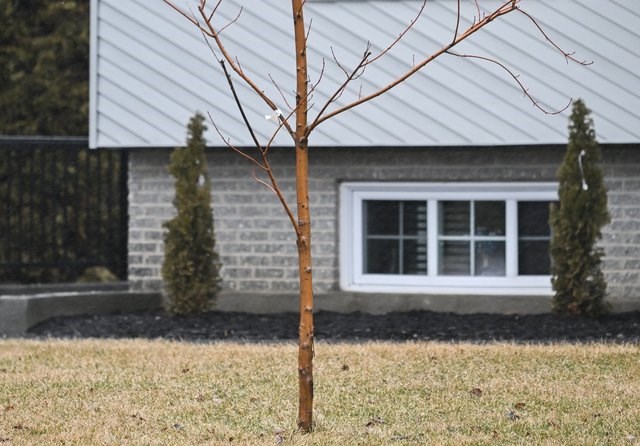
A young tree on the lawn of a residential property in the town of St-Amable, Que., on Thursday, April 3, 2025. The town is imposing a $200 tax on residents who don't have a tree in their front yard with the goal of reducing heat islands. THE CANADIAN PRESS/Graham Hughes.
April 06, 2025 - 3:00 AM
MONTREAL - In the town of St-Amable, Que., it's plant or pay up.
As of this year, the municipality located 30 kilometres northeast of Montreal is imposing an annual tax of $200 for residents who don't have a leafy tree in their front yard, with a goal of reducing heat islands and improving biodiversity.
One public policy expert says using taxes to get people to be more green is a smart way to address environmental challenges — although not all residents agree with the town's approach.
Jean-Sébastien Ménard, the town's general manager, said the rule requiring a tree in every front yard has been on the books for years. But officials were moved to start enforcing it when they learned the results of a recent mapping project by Université Laval, which found the town was "highly exposed" to heat waves due in part to heat islands — buildings and patches of concrete or asphalt that raise temperatures higher than in surrounding areas.
"It's for the health of our seniors, for the health of young people, to lower the ambient temperature in St-Amable," Ménard said. "So it's super important."
He said the town of about 13,500 people has expanded rapidly in the last 20 years, which has resulted in a loss of trees. Without the cooling effect of greenery, the heat islands can worsen the impact of high summer temperatures.
Ménard said the town hired a mobile mapping company called Jakarto to scan lawns, and it found that about 1,200 of 3,000 yards were missing trees. Notices were sent out and the town held two sales to offer trees at a discount, which resulted in most residents complying.
He said about 400 homes received the $200 charge when the tax bills went out this year.
Fanny Tremblay-Racicot, a professor of municipal administration at Quebec's école nationale d'administration publique, says St-Amable's initiative is an example of "ecofiscality," which is a set of public policy tools to encourage people to adopt environmentally friendly behaviour — or pay up.
St-Amable is the first town she knows of that is taxing treeless yards, but she says plenty of other cities have adopted measures along similar lines, such as imposing a fee for parking lots or charging developers for each tree they cut down. The advantage of using taxes, she said, is that enforcing them involves less bureaucracy compared with the traditional ticketing process.
"When it's a (bylaw), the city has to verify, send a ticket, enforce the regulation, and possibly go to municipal court, so it adds really significant costs," she said.
She said St-Amable's choice to incentivize tree planting is an interesting one, because it permits the city to reach several objectives. "It allows for better rainwater retention, it reduces heat islands, it facilitates air filtration, so we can reach several goals at once with climate solutions founded on nature," she said.
Not everyone in St-Amable believes the town is going about its goals in the right way, however.
Sara-Kim Orobello, who owns two properties, said she bought trees from the municipality and planted them, but when her tax bill came, she had a $200 charge for one home, after the town said it hadn't received the form she was required to submit. She said a rental company she works for also received the tax for some properties, despite planting the trees — although in those cases she admits the forms weren't submitted.
She said she hasn't succeeded in reversing the charge, even though she has receipts from the city proving she bought a tree from them.
"I did my duty as a citizen, and I planted the tree," she said, adding that she understands the need for greenery and environmental measures, but feels citizens who act in good faith aren't being listened to. "When we're compliant, they shouldn't be hounding citizens. Two hundred dollars is a grocery shop," she said.
Simon Lacoste, a resident and former St-Amable mayor, believes the city's approach is "unfair and abusive." He said he's heard from several residents who were taxed despite having trees, while he said others thought they had complied only to be told their trees didn't count because they were considered shrubs.
He believes the town could have accomplished its goal by working with citizens rather than playing "tree police."
"There's an administrative mess surrounding this tax, which is poorly managed," he said. "The base policy of greening, I completely agree with, but it created injustice."
Ménard said about half of the 50 or so people who contested the tax have succeeded in having it overturned — often because their tree was missed by the software that scanned the yards.
He said that while a small group of citizens might not be happy, most are on board with the town's environmental ambitions, which include doubling its tree canopy and planting more than 12,000 trees on public land in the coming years.
This report by The Canadian Press was first published April 6, 2025.
News from © The Canadian Press, 2025